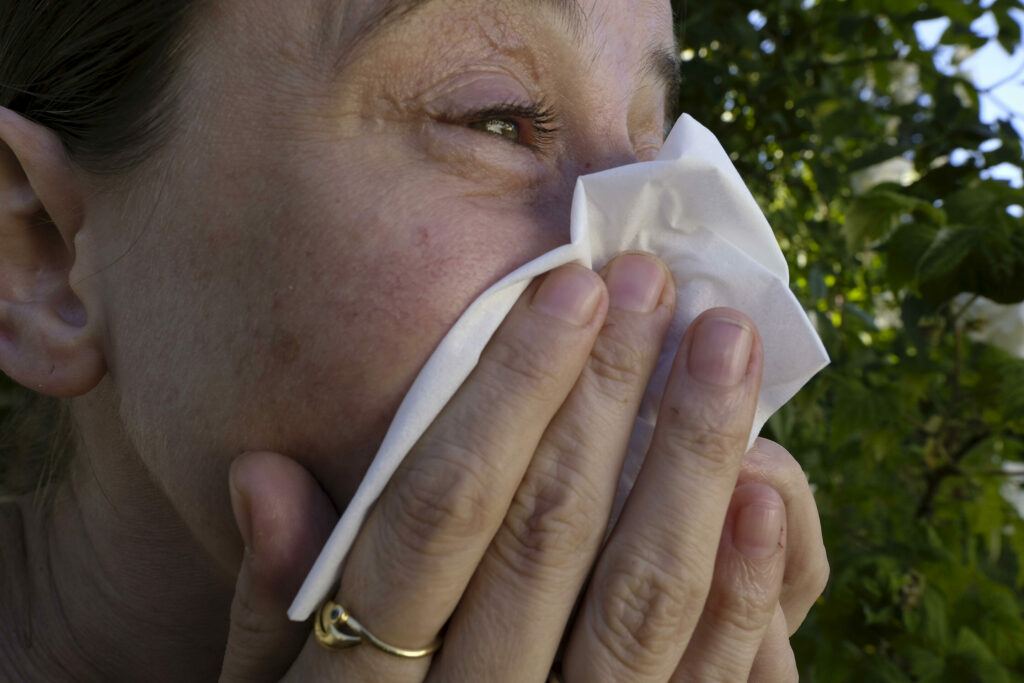As spring blooms, so do pollen allergies.
For many people, this season is marked not only by blossoming trees and warmer weather but also by sneezing, itchy eyes, nasal congestion, fatigue, coughing and a runny nose.
Here's a practical guide to managing the discomfort from these troublesome allergies.
Checking pollen forecast daily
Websites and weather apps often include daily pollen levels; the discomfort you may experience depends on the weather conditions.
Rain, wind, and temperatures will, therefore, have an impact. Warm air and higher temperatures will increase pollen counts. On the positive side, a sudden drop or even a temperature freeze can halt pollen production.
However, with temperatures varying widely from day to day (which can be the case for Belgium), spring can make a person’s sensitivity to allergens more severe.
The constantly changing and varied temperatures cause the body to boost the immune system. Further, into the pollen season, the body will be even more hypersensitive or hyperactive to the new pollen produced.
The alder and birch pollen season is a very unpleasant seasonal allergy that may make your life quite difficult if you're affected by it. Sadly, The birch pollen season is in full swing.
In Brussels, concentrations have exceeded the critical threshold of 80 grains/m³ of air, putting most allergy sufferers at a high risk of symptoms. Maximum vigilance is therefore advised. Meanwhile, other trees, such as ashes, hornbeams, poplars, willows, elms, and cypresses, have also started blooming.
Digital tools
Several websites provide real-time information on pollen concentrations in your region. They also offer five to seven-day forecasts :
AirAllergy: This is the official government website, with monitoring stations in Brussels, Marche-en-Famenne, Baudour, Tournai, De haan (Le Coq), and Genk. An iOS and Android smartphone app is also available.
IRM: The new prevision model for pollen is also available on the IRM website.
For Dutch speakers: Meteovista
Practical tips
On high pollen days :
- Limit outdoor activities in the morning and early in the afternoon
- Avoid going out when it's windy or, at the very least, wear sunglasses
- Do not dry your laundry outside
- Keep windows closed at home and in the car
- Air out your home, preferably when it's raining
- Don't mow the lawn yourself, and avoid being nearby when someone else is mowing it
- Be aware that your pets can quickly bring pollen into the house on their fur
- Make sure the air inside your home isn't too dry. If this is the case, use air humidifiers.
It's essential to remember other factors that can worsen your discomfort: tobacco, air fresheners, scented candles, incense, cleaning products or DIY materials; all of which can irritate the respiratory system. Wearing an FFP2 mask is also recommended to limit contact reactions.
On the bright side, a little getaway to the coast to enjoy the fresh sea air can not do you any harm.
Medication
Put in mind that allergies to pollen are relatively unknown and understudied and thus rarely cured.
There are genetic predispositions responsible for this condition and other epigenetic factors, meaning that they can not directly be linked to the genes by themselves but to how those genes are regulated; influenced by our environment and the way we were exposed during the early years of life.
Treatments aim to stabilise, and achieve good control over the symptoms.
You should always talk to your doctor about your allergies, and not just ' live with it '. Antihistamines can already help control part of the symptoms. If that's not enough, anti-inflammatory treatments can be considered.
Desensitisation therapy
Desensitisation consists of injecting increasing doses of the allergen to make the patient progressively more tolerant to it.
The treatment is spread over a period of 3 to 5 years and must be carried out by a doctor.
The protective effect of desensitisation normally last for several years after the end of the treatment
Psychological effects
Pollen allergies can make you feel grumpy. They affect your sleep, and thus, energy levels, mental sharpness and productivity. They also affect your sense of smell and limit your activities which, in turn, can affect your mental well-being.
It is important to be aware of the link between allergies and mental health, and mention it to your doctor.
Pollen allergies affect almost 25% of the Belgian population the best advice will be avoiding peak pollen times. It's not just a seasonal nuisance but a chronic condition that deserves proper management. With the right tools, treatments and information, spring doesn't have to be a hurdle.

